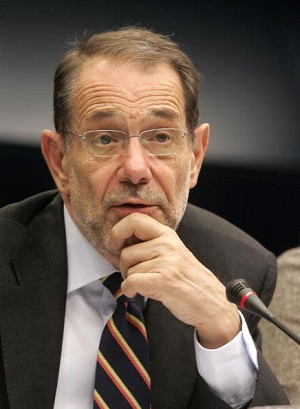Javier Solana on European Debt Crisis and China-EU Relations

Javier Solana was EU High Representative for Foreign and Security Policy, Secretary-General of NATO, and Foreign Minister of Spain. He is currently President of the ESADE Center for Global Economy and Geopolitics and Distinguished Fellow at the Brookings Institution.
Q: Why has the European debt crisis lasted so long? Is the worst over?
A: The current crisis has swept the entire globe; however it has affected each country and continent varyingly. Take the US, for example, which is mired in successive rounds of fiscal cliffs and sequesters.
What has made Europe’s situation unique is the fact that two critical moments coincided: on the one hand, the global economic crisis, and on the other, the adaptation of the governance of the Eurozone. While the second may seem to be prolonging the first; in fact the crisis is accelerating the change in governance. What will emerge from all of this is a more robust governance structure, more capable of weathering extreme circumstances.
Q: In your view, what are the major causes of the debt crisis?
A: The current crisis was sparked by the burst of an international financial bubble which affected the entire world, but developed nations first and foremost. Repercussions have been distinct for each country. In Europe specifically, the global crisis cast a spotlight on the pre-existing imbalances within the continent. These imbalances have played a major role in how the crisis has played out in the EU.
Q: Does the debt crisis mean that the European model is obsolete, if not dead?
A: The European model is not dead. On the contrary: the European Union is a highly resilient structure, which will not only overcome the current difficulties, but also emerge as an entity which is reformed and better adapted to the global environment it functions in. This reform process was accelerated by the crisis, and what will emerge is a Europe which is more alive than ever. The EU will not only overcome, it will become better prepared to take up its place on the global scene.
Q: What is your opinion on China's role in helping Europe tide over the crisis?
A: I am absolutely satisfied with the constructive attitude China has maintained towards Europe in its time of crisis. Moreover, I am hopeful that relations between Europe and China will continue to deepen and improve, not only on the economic level, but beyond. In today’s multipolar world, the bilateral relations maintained by China and the EU form an element of global stability.
Q: Finally, what do you think of the status quo of China-European relations? What are the problems that both sides need to consider?
A: As I said before, the relations between China and Europe are deep, as well as strategic. There are undeniably still problems, including a range of economic issues which will require constructive dialogue. However, I think the crisis has shown that cooperation between us is possible, both bilaterally and multilaterally in the international institutions.
Regarding obstacles in our relationship, I am convinced the most important step is to deepen the trust – and when I say trust, I mean a very specific type of deep trust, which I like to call strategic trust. The globalized world we all live in requires trustful relations of a strategic nature, and this is something that must be cultivated and fostered from both sides.
- Back _articles: Thomas Renard on China-EU Relations
- Next _articles: Mr. José Luis de Sales Marques on Macau, China and Europe